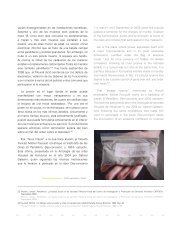¿cómo explicar esto que está ocurriendo hoy?, porque, ya sabemos ...
¿cómo explicar esto que está ocurriendo hoy?, porque, ya sabemos ...
¿cómo explicar esto que está ocurriendo hoy?, porque, ya sabemos ...
Create successful ePaper yourself
Turn your PDF publications into a flip-book with our unique Google optimized e-Paper software.
A esta personalidad <strong>que</strong> no repara demasiado<br />
en la situación material se atiene gran parte de los<br />
creadores hondureños, quienes además han sabido<br />
soportar la ausencia de instancias públicas y privadas<br />
<strong>que</strong> pudiesen vindicar de mejor manera los resultados<br />
de su imaginación. Pero esta indiferencia extrema no<br />
es ninguna victoria; todo lo contrario, es reaccionaria y<br />
enajenante. Es tarea de los artistas actuar políticamente;<br />
a ellos, más <strong>que</strong> a otros, les corresponde exigirle al<br />
Estado una infraestructura digna para la circulación de<br />
sus obras y pensamientos. En relación con las artes<br />
plásticas, crédito exagerado le daríamos a este si<br />
dijéramos <strong>que</strong> cumple con sus ¡tres! instituciones (dos<br />
educativas y una museal), y peor si pensáramos <strong>que</strong> tiene<br />
algo <strong>que</strong> ver con las instancias privadas, fundacionarias<br />
y asociativas. Para éstas sólo cabe el voluntariado y la<br />
cooperación internacional.<br />
Aun<strong>que</strong> la infraestructura es un problema, hay <strong>que</strong><br />
saber <strong>que</strong> no es el único. La superestructura es también<br />
una zozobra. Las preferencias del tipo ‘me gusta/no me<br />
gusta’ del director o de la junta, en muchas de estas<br />
instituciones, son el único aval para <strong>que</strong> cualquier bien<br />
o agente cultural pueda circular en sus recintos o capte<br />
un poco de su presupu<strong>esto</strong>. A este despotismo súmese<br />
el oportunismo. Para <strong>esto</strong>s administradores, la cultura<br />
tiene menos un valor histórico y de acción comunitaria,<br />
<strong>que</strong> un valor de intercambio en las esferas crecientes del<br />
mercado ONG.<br />
Pero la situación es una y los hechos son otros. El arte<br />
hondureño, en mucho de su decir, parece ser inmune a<br />
estas desgracias oficinescas, y gracias a su lucidez, no<br />
cree en ninguna versión ‘programada’ de la realidad. El<br />
buen artista ni siquiera las toma en serio; sabe <strong>que</strong> sus<br />
predicados son ante todo suyos.<br />
Honduran creators rely to a great degree on this<br />
personality that does not care too much about the<br />
material situation, and in addition have known how to<br />
bear the absence of public and private instances that<br />
could vindicate in the best possible way the results of<br />
their imagination. But this extreme indifference is not<br />
a victory at all; on the contrary, it is reactionary and<br />
alienating. It is a task of the artists to act politically;<br />
they, more than others, have to demand from the State<br />
a worthy infrastructure for the circulation of their works<br />
and thoughts. Regarding the plastic arts, we would give<br />
exaggerated credit to the State if we said that it fulfills<br />
its obligations on this score, with three (!!) institutions<br />
(two educational and one curatorial), and worse still, if<br />
we thought that it was involved with private initiatives,<br />
foundations and associations. For these, only voluntary<br />
service and the international cooperation are applicable.<br />
While the infrastructure is a problem, it is not the only<br />
one. The superstructure is also uncertain. Preferences<br />
such as ‘I like it/I don’t like it’ from the director or the<br />
board, in many of these institutions, are the only<br />
endorsements needed in order for a cultural work or<br />
agent to circulate in its enclosures or garner a little of<br />
its budget. To this despotism is added opportunism.<br />
For these administrators, culture has less historical and<br />
community-action value than trade value in the growing<br />
spheres of the NGO market.<br />
But the situation is one thing and the facts are another.<br />
Honduran art, inasmuch as it exists, seems to be immune<br />
to these bureaucratic misfortunes, and thanks to its<br />
lucidity, does not believe in any ‘programmed’ version<br />
of reality. Good artists do not even take them seriously;<br />
they recognize that their subjects are above all their own.<br />
30 32 34 36 38 40 42 44 46 48 50 52 54 56



